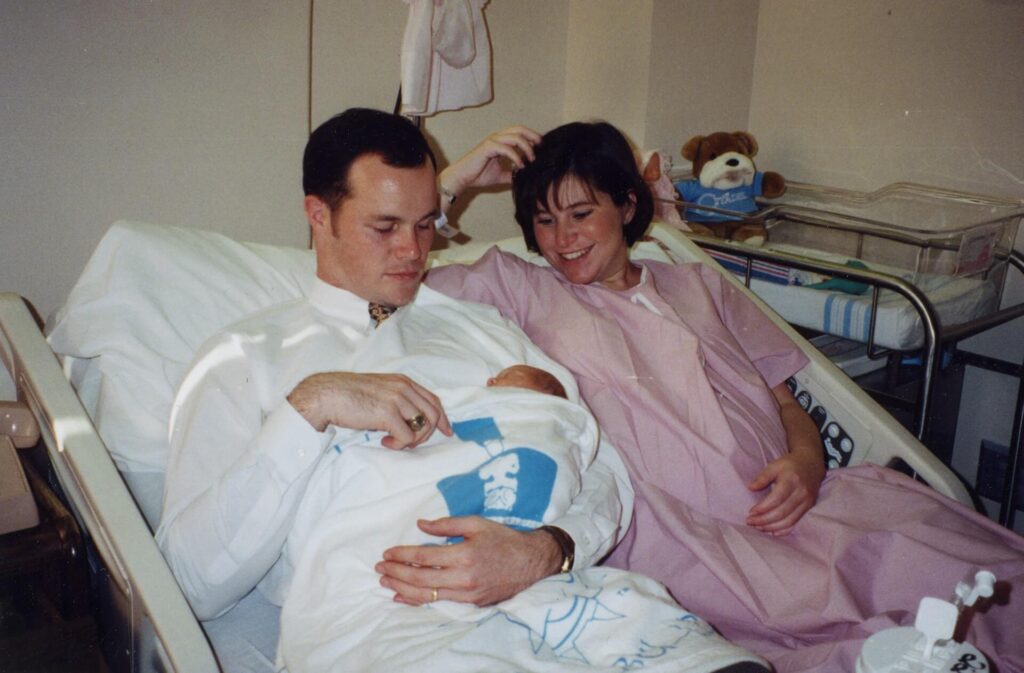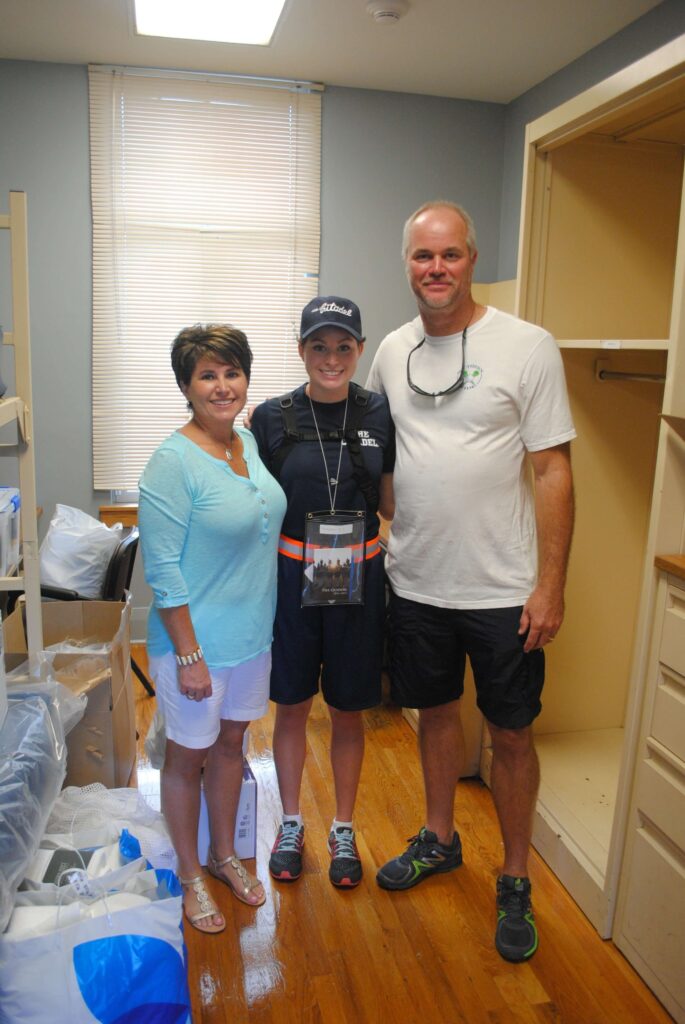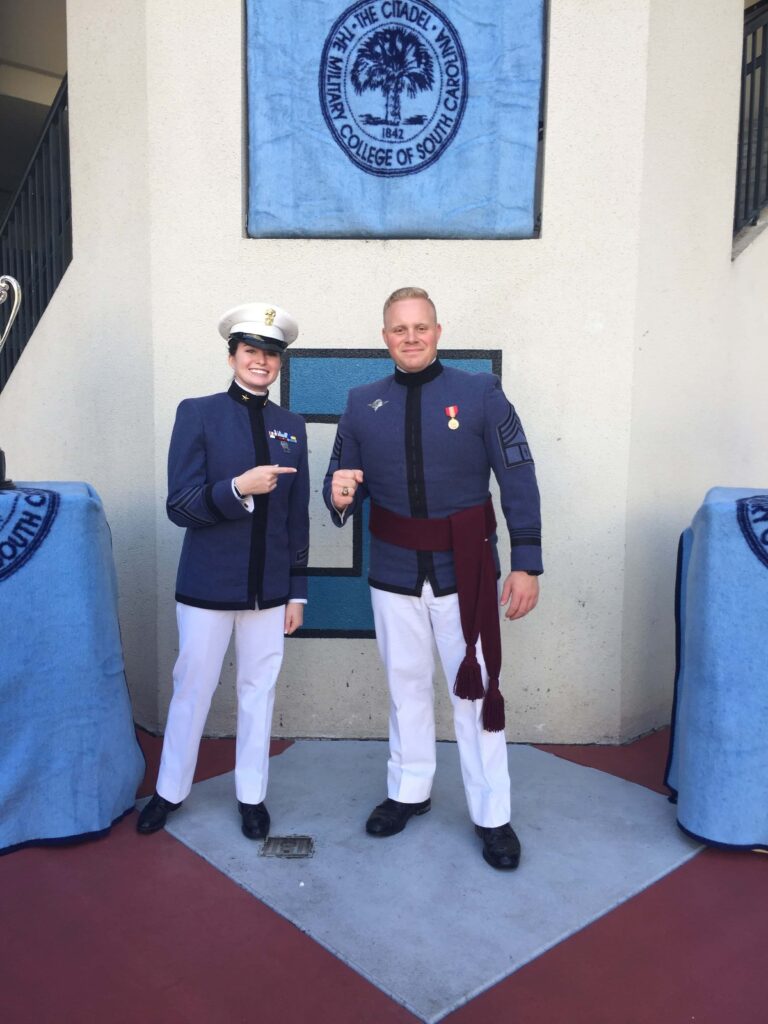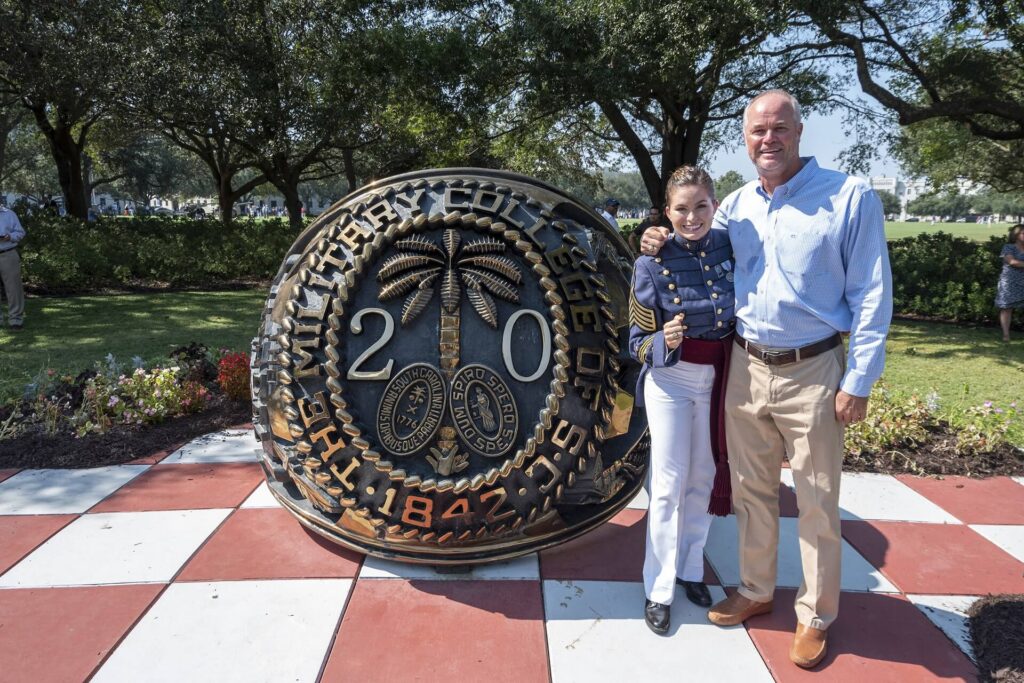The Citadel has had an enduring presence in Bailey Richardson’s life for as long as she can remember, but it was not until she was at a football game her junior year in high school that she realized how much the military college meant to her.
I have a vague childhood memory of being on my daddy’s shoulders as he walked onto a large football field. I remember that the people on the field were all men, and they were all wearing Hawaiian shirts. I think that’s what makes the memory stand out—the Hawaiian shirts. I was surrounded by men in a rainbow of colors, but in the stands was a sea of people in gray and blue.

It wasn’t until I was a freshman marching out onto the very same field that I pieced together the memory and put a name to the place. Only this time, I was not a little girl visiting with her dad—I was a member of the South Carolina Corps of Cadets. When I asked my dad, a ’95 grad, about it, he said that I had gone with him to his five-year reunion. I was only two.
How is it that I ended up at that same place years later, just like my father, in love with the same institution?
My second fixed memory of the campus is when I was a junior in high school visiting The Citadel for homecoming. Homecoming is the biggest weekend of the year to alumni. I had never thought of attending The Citadel. I don’t know exactly when I made the decision during the homecoming football game, but I remember looking up to the far right of the home stands and seeing the knobs standing. Knobs are freshmen—they have to complete fourth-class training to become members of the Corps of Cadets.
“Why on earth,” I asked my dad, “are the knobs standing the entire game?”
“That’s just what they have to do,” he told me.
I remember laughing and thinking to myself that it seemed pretty cool. I guess you might call it my “aha moment,” when I knew I wanted to go to The Citadel.
A year later, I was a high school senior getting ready for college. I signed up to play on the golf team, and I interviewed and was accepted into the Honors Program. In November, I was invited to write a paper and debate with other applicants to compete for academic scholarships. I had the honor of winning a full academic scholarship. On March 22nd, one day before my 18th birthday, a letter came in the mail telling me that I received another scholarship. I had been awarded the college’s most prestigious scholarship—the Star of the West Undergraduate Scholarship. I was stunned, but the biggest kicker was when I started receiving phone calls from the faculty at The Citadel, local news stations and The Post and Courier as well as letters from alumni and past recipients of the scholarship. It was then that I learned I was the first woman in the college’s history to receive this scholarship. I was so humbled to learn that people who had never met me believed in me. My sister said something later that really resonated with me: “The Citadel chose you just as much as you chose it.”

Before I knew it, matriculation day had arrived. On that August day, the incoming freshmen report to their home companies for a week of fourth-class training before the rest of the Corps arrives and classes begin. During matriculation you meet your cadre, the cadets who will be training you, and you meet your classmates—the people who will be there for you and understand what you are going through. They are your companions, and some will become your best friends for life. And while it may sound fun, it was actually scary. Why? Well, because you are one of about 700 others matriculating, and you have to wait in the longest line. Naturally, you start to worry because it is intimidating. You know it’s not the huge welcome party you might experience at a traditional college—it’s a culture shock full of change and rigid rules to mold you into a phenomenal leader, but I was ready.
I found some comfort that day when I met my company commander, AJ Crosby. I had met him before on my pre-knob visit in Charlie Company. A pre-knob visit is an overnight visit for high school students interested in attending The Citadel. It allows you to get a better perspective of cadet life. At my pre-knob visit, I was paired with Rowan Brooks, who became one of my really good friends, and it was then that I met Crosby, who would become my senior mentor.
Just as in life, there are takeaways. The Citadel has a way of making you learn lessons in the oddest but most memorable ways. You’re exposed to leadership and opportunities to lead that you would not find anywhere else. The takeaways throughout my three years so far have a theme because, just as you progress through your academic program, you also progress through a series of life lessons.
Freshman year is the most talked about year because you are a knob, but it is not necessarily the hardest. You simply do what you are told. Freshman year, I found myself. I found my love for biology and the college, and I found my drive to be my best, more than I had ever realized. But the more I strived to be my best, the more I felt that others and I myself found faults with my performance.
My first takeaway—you will never be perfect. When you are a knob, the cadre and upperclassmen are always going to find something wrong with you or your uniform. I was so disappointed in myself when my shoes weren’t top notch, when I had the tiniest crinkle in my uniform—anything. It didn’t matter if the upperclassmen didn’t point it out because I got mad at myself for not meeting the standard. I learned to be confident in my abilities, knowing deep down that I would always try my best. There is no such thing as perfection. Anything can always be done better, but instead of focusing on what you do wrong, focus on what you do right.
A positive attitude carries you a long way through knob year. True strength is knowing that at the end of the day you may not have done something perfectly, but you gave it your best.
Sophomore year has been the hardest year so far. It is vastly different from freshman year because you have much more freedom. You also have to set an example for the knobs, but the hardest part for me was the pressure to perform. I stressed myself out worrying whether I was good enough to be company clerk and battalion clerk and if I was up to the responsibility of leading my classmates, who were very qualified themselves. But people above me believed in me. My cadre squad sergeant from my freshman year, Ben Carminucci, was one of my role models. He believed in me just as Crosby did. It was from these two cadets that I got my next takeaway—not everybody is going to like you.

Naturally, I want people to like me. But sophomore year was when I had to learn that it’s just not possible. Nobody is liked by everybody. All you can do is your best. Know in your heart that you are capable and have a great support team. This lesson expanded upon my lesson from knob year. If I had not learned to believe in my abilities and become aware that perfection is far-fetched, I would not have learned to accept that some people simply would not like me. At the end of the day, the people you want on your side will be on your side. I will never forget Crosby saying to me, “If everybody likes you, you are not doing your job as a leader.”
Junior year was probably the craziest year for me. My classes were more difficult as I got further in my major, and my job in the Corps as regimental administrative NCO was no joke. You reap what you sow—that was the takeaway my junior year. Let me elaborate. I worked hard on my rank my junior year. I also took 21 academic credit hours the first semester and 22 the second. I spent many hours in front of my computer, slaving away on my studies and my work as administrative NCO. There were times when I thought I would not be able to handle both and would fail at one, but I gave it my all and didn’t worry about things I could not control. At the end of it all, my semester grade point average was a 4.0, and I got a chance to interview for regimental commander.
I wanted an opportunity to pursue that position as far back as freshman year. I remember I told my grandfather that was my dream—a shot at becoming regimental commander, and he told me to go for it. The last time I saw him, he was in a hospital room at the Medical University. I was wearing my summer leave uniform when I visited him. I told him that I was doing well and loved The Citadel. He had a tube in his mouth and couldn’t talk, but he smiled and gave me a thumbs up. I like to imagine that he was smiling down on me when I got the email offering me the interview.
The position ultimately went to an outstanding and well-deserving classmate, Ben Snyder. I was named regimental executive officer, and I am excited about what lies in store for the 2020 command team. As I begin my senior year, I know that it too has another takeaway in store for me. Whatever it may be, it will be something that I will be able to carry with me in life.
The Citadel has a way of making people fall in love with its tradition. It allows you to feel like you are a part of something bigger than yourself. You are part of a tradition that strong men and women have carved throughout time. Traditions, new and old, are the lifeblood of the institution, and The Citadel has taught me that you must adapt to change in the world or you become irrelevant.

Bailey Richardson is a native of Galivants Ferry. A biology major, she was originally assigned to India Company and now serves as the regimental executive officer of the Corps of Cadets, one of the highest-ranking officers in the Corps. She hopes to attend medical school following graduation in May.
